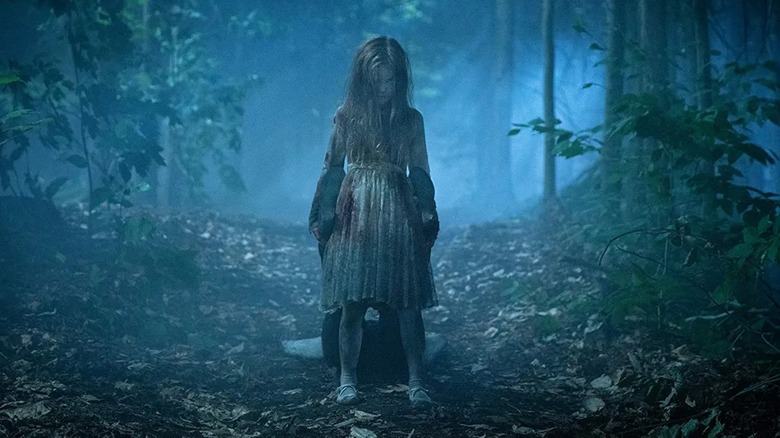Warner Bros. Pictures
“Dead fields under a November sky, scattered rose petals brown and turning up at the edges, empty pools scummed with algae, rot, decomposition, dust…”
These evocative lines from Stephen King’s “Pet Sematary” encapsulate a bleak and inevitable decay, a part of the natural life cycle destined to happen. The certainty of death and the accompanying grief can sometimes push us over the edge, making us question the cyclical nature of life and death. This is the predicament faced by the Creed family in King’s 1983 novel, where the concept of a primordial graveyard resurrecting the dead holds a powerful sway over hearts shattered by grief. Yet, the dead should remain so, as any form of resurrection carries an eerie quality, with these revived beings appearing and feeling “somewhat dead.”
The allure of “Pet Sematary” is self-evident: King’s frank, accessible prose harmonizes perfectly with the raw subject matter, highlighting the unmet desires of human life, including the yearning to hold onto loved ones even after death. Throughout the novel, the ordinary daily life is contrasted with the disturbing events that envelop the Creeds, crafting a disquieting blend of emotions that persist throughout the story.
Interestingly, when King penned “Pet Sematary,” he was convinced that “nobody [would] want to read” his novel, considering its dark and gruesome content, even for his standards. In a discussion with NPR, King mentioned “Pet Sematary” and his 1986 bestseller “It” as two books that he thought would fail. Fortunately, they did not. On the contrary, these two novels are among his most celebrated works, repeatedly adapted due to the exciting and enduring nature of these horror narratives.
No Stephen King story is too intense for his readers

Paramount Pictures
King expressed to NPR his apprehensions that his two novels — “Pet Sematary” and “It” — would not be well-received by his readers. He was, however, pleasantly surprised to discover that it’s challenging to repel an audience that values the darker facets of horror:
“Well, I had one novel called ‘Pet Sematary’ that I wrote and put in a drawer because I thought nobody will want to read this. This is just too awful. I knew what it was going to be about, and I knew that it was going to be about a father who lost his little boy and had to dig him up and rebury him in a different graveyard. And I thought to myself, this is awful. I wanted to write it to see what would happen, but I didn’t think I would publish it. And I got into a contractual bind, and I needed to do a book with my old company. And so I did, and I found out, to sort of my delight and sort of to my horror, that you can’t really gross out the American public [laughs]. You can’t go too far.”
The author continued to say that “the same thing is true with ‘It,’ about the killer clown who preys on children.” King’s “It” has received various adaptation treatments over the years, with the most recent film series directed by Andy Muschietti further popularizing a seminal story about childhood fears, bonds formed by trauma, and the horrors hidden beneath idyllic exteriors. The novel delves into some truly dark corners (which are thankfully left out in the films), but ultimately, there is a sense of catharsis in overcoming the evil that has haunted a town synonymous with pain and loss for the children who grew up there.
With these considerations in mind, King’s remarks about his novels seem logical. However, it’s also true that well-crafted, compelling horror will always find an audience, regardless of how grim or bleak it might be.
Credit: www.slashfilm.com


